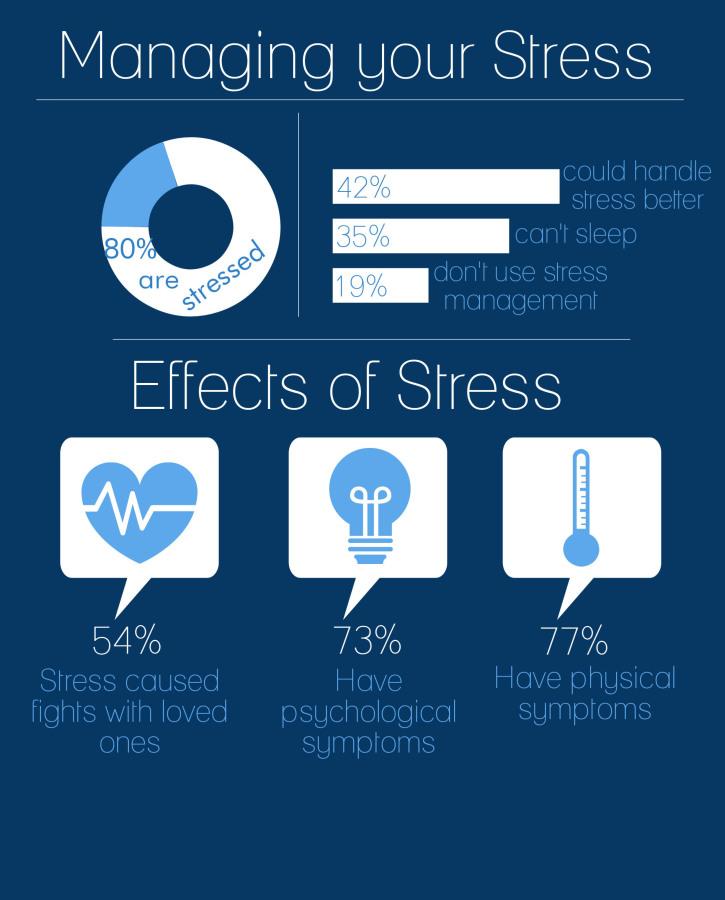There are many stressors in the everyday life of a high schooler and beyond, from the need to get good grades to impress colleges to managing extracurriculars, a social life, and homework.
There are many ways to cope with the stress of everyday life. But before a person can deal with their stress, they need to understand what is causing it. Many times, the causes aren’t clear because it could be a lot of little things going on in life rather than one big event, like a project due in school, which is more evident and easier to understand.
Some ways to help identify stressors is to pay attention to any time throughout the day when stress creeps up. Students tend to repress or avoid dealing with stress and distract themselves with anything in the present moment, only to feel the stress overwhelming them later on when they are by themselves doing homework and without the distractions within everyday moments.
According to the Mayo Clinic, some stressors in school include getting a bad grade on a test, struggling on the border between two grades, not understanding what is going on in class, having a conflict with a significant other or a friend, having to deal with tragedies in the family, and so on. The list is endless. Seniors could be stressing about getting into the college they want, disappointing parents by not fulfilling their expectations, doing poorly on a sports team or not improving in performance throughout the season.
“My life stresses me out,” stated junior Cynthia Capota. “The fact that I’m in 4 AP classes and the rest honors, I do work. Doing debate, scholastic bowl, and top cats is kind of a time-consuming schedule. Oh! And then I also have friends. I also have a family, so I obviously want to spend time with them at the same time. It’s just stressful. But I’ve just gotten to the point where I’m so stressed that I don’t even feel the stress anymore and my mom thinks I’m stressed, but I don’t feel stressed.”
Helpguide.org hypothesizes that when students pay attention to their emotions during the day, it helps them figure out what is stressing them out and how to fix it. As humans, students do anything possible to fit in and try to have perfect lives and so will repress any start of stress instead of getting it over with in that moment. By dealing with it in the moment, it could stop the building up of it. The counselors in the school are here to help students deal with and fix their situations and stop any potential situations that could cause stress.
One easy way to help reduce stress in life is to start having a healthier lifestyle. Eating the right foods that are needed and exercising are key to improving health. The healthier a person is, the easier it is for them to be able to clearly think and deal with the stress of life.
“Sometimes, switching up eating habits or by just getting some fresh air can make someone feel better,” G-P LST social worker Mrs. Meagan Silverberg added. “It can help clear the head since your body will feel better and have more energy.”
The same goes for getting an adequate amount of sleep. With extracurriculars, homework, and school early the next morning, it is difficult for students to get the amount of sleep that they need to significantly reduce stress in their life. As stated by helpguide.org, having enough sleep not only increases attention during the school day and helps students focus on their classes more, but it takes away the stress of needing enough sleep. With the right amount of rest, students can focus on the topic that the teacher is discussing rather than on not falling asleep during class.
Another way to deal with stress is to put aside a little free time every day to relax and enjoy life. “It’s important for students to know what their limits are and to not go beyond them…it’s also important that they realize that it’s okay to just take some time for themselves. Like to hang out with friends or watch Netflix, you know, whatever makes them happy,” explained Mrs. Silverberg.
Making a list is another helpful way of finding out what is stressing a person out and making the stressors seem more manageable according to helpguide.org. On paper, the list seems smaller than it seemed just swirling around in one’s head and it can help a person focus on just the tasks that they need to get accomplished. Since they are listed on paper, it is easier to plan out a schedule for finishing stressful activities and keep the mind on the task of finishing each activity at a time while keeping it away from the overwhelmed feeling that accompanies stress. By doing something positive and active to fix the stress, it can counteract the overwhelming emotions and reassure the person that they are doing something productive to fix their problem rather than wasting time.
However, not all stressors can be fixed just by finishing an activity like homework or part of a project. Many times, stress comes from having a fight with a friend or significant other or from the combination of the stressors at school, plus added ones from tragedies or uncontrolled events that can happen.
When a friend has a lot of their plate, Mrs. Silverberg recommends that just “being there for you friends during a tragedy is the best thing someone can do. Just hanging out and talking to them can help distract them from what’s going on and can help them feel better.”
There also are things at school to help students get to the root of their problems or to get added support for whatever stress that is going on in their life. The counselors are always there to talk to students about anything.
However, there are also student groups that meet and the students talk about the things going on in their own lives, which can be very beneficial. Mrs. Silverberg explained: “These groups can sometimes be more helpful than just talking to an adult or counselor because it’s a different kind of feeling to hear a person your own age talking about an experience similar to yours and how they deal with it. It helps bring students closer together and feel better about what they’re going through.”








